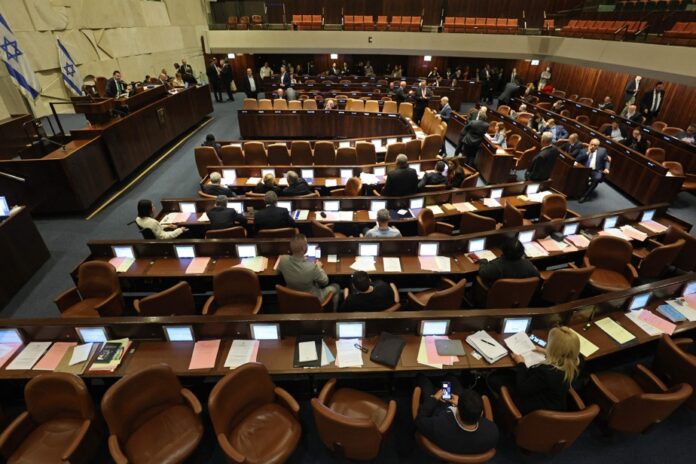(Jerusalem) The settler movement won a victory in the Israeli parliament on Tuesday by overturning a law banning Israelis from traveling to an area in the northern West Bank from which Jewish residents were evacuated in 2005.
In 2005, Israel withdrew unilaterally from the Gaza Strip, evacuating Jewish settlements in this Palestinian territory as well as four settlements in the northern West Bank, around Nablus.
The law passed to allow this disengagement has since prohibited Israelis from traveling to these areas, but an amendment finally adopted in a vote in Parliament now allows them to return to the evacuated part of the northern West Bank.
This vote makes possible a possible legalization by the Israeli authorities of a colony recreated without their approval in Homesh, the only one of the four Jewish colonies in the area whose inhabitants had to be evacuated by force in 2005, before the destruction of the places by the Israeli army.
The entire Israeli settlement enterprise in the West Bank is deemed illegal under international law by the UN.
The United States on Tuesday said it was “extremely concerned” by the vote, calling the decision “provocative” and in violation of promises made by Israel to its American ally.
While the Israeli-Palestinian conflict seems to have been swept into a new spiral of violence since the entry into office at the end of December of one of the most right-wing governments in the history of Israel under the leadership of Prime Minister Benjamin Netanyahu, the Council UN Security Force on February 20 called on the “parties to exercise calm and restraint and to refrain from any act of provocation”.
The Council reiterated that it “strongly opposes all unilateral measures that impede peace, including, among others, the construction and expansion of settlements by Israel, the confiscation of Palestinian lands and the ‘legalization’ outposts of colonies”.
Far-right settlers have made Homesh outpost a symbol of their struggle and created a movement called “Homesh First”. A small group of activists set up a “yeshiva” (institute for Talmudic studies) there in 2009, which has since been evacuated dozens of times by law enforcement, until the army finally let them go. install.
Israeli Finance Minister Bezalel Smotrich, himself a resident of a settlement in the occupied West Bank and for whom “Palestinians don’t exist”, as he said on Sunday, on Twitter called the vote “historic”. .
“Tonight, we begin to erase the shame of expulsion and move forward with regularizing our presence in Homesh,” he added.
MK Limor Son-Har Melech of the far-right Jewish Force party, who lived in Homesh in 2005, tweeted that she was having “a moment of infinite joy”.
The Israeli anti-settlement movement Peace Now said the law change would “strengthen the occupation”.
“In addition to a coup against power, we are witnessing a dangerous messianic coup that will strengthen the occupation,” writes the NGO.
The Palestinian Islamist movement Hamas condemned a “crime” and called on the international community to “stop the Israeli colonialist occupation”.
In December 2021, an AFP photographer had seen the yeshiva in Homesh but also a dormitory, two makeshift installations made up of tarpaulins mounted on wooden frames, under guard of the Israeli army.
In 2022, violent clashes took place between Israeli forces and residents of the neighboring Palestinian town of Burqa, opposed to the return of settlers to Homesh where around 70 families lived before the withdrawal of 2005.
Despite Tuesday’s vote in parliament, settler facilities in Homesh remain illegal under Israeli law. Following yet another Supreme Court appeal by Burqa residents demanding that the state evict the settlers from Homesh, the court gave the government 90 days in January to justify their non-eviction. The plaintiffs claim that the land on which the settlers are settled belongs to them.
Orit Struck, Minister of National Missions (responsible for Jewish settlements in the West Bank) and member of the far-right Religious Zionism party, led by Mr. Smotrich, visited the site on Tuesday and said that “it is a great day for Israel,” according to a statement from the state body managing settlements in the northern West Bank.
Outside of annexed East Jerusalem, some 490,000 Israelis reside in settlements in the West Bank, a territory occupied by Israel since 1967 and home to 2.9 million Palestinians.


















